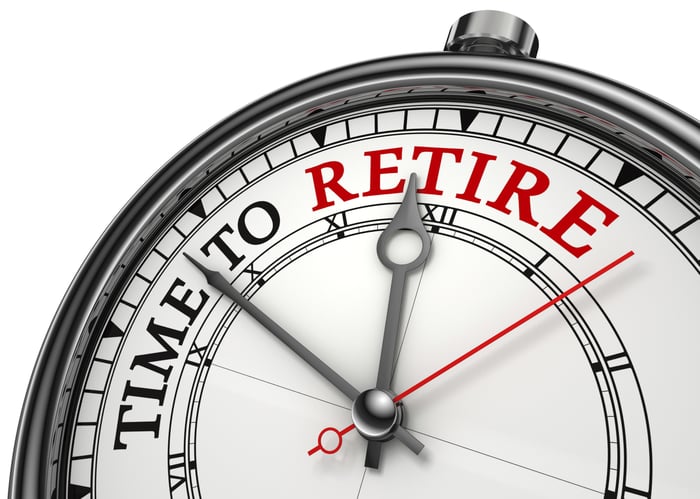
Image source: Getty Images.
I bet you can think of plenty of reasons not to retire early. For example, you might face steep healthcare costs, you might run out of money, or you might get bored. Those are legitimate concerns, yet there are some good reasons to consider retiring early anyway. Here's a closer look at four big ones.
You don't know how long you'll live
Yes, we all know this on some level -- yet we're still happy to ignore it, assuming we have many years ahead of us. According to the Social Security Administration, "A man reaching age 65 today can expect to live, on average, until age 84.3," while while his female counterpart can expect to live to 86.6. But those are just averages, meaning that many of us will live shorter lives than that. Since you don't know how long you will live, retiring early will give you a greater chance of being able to enjoy as many work-free years as possible.
You'll also be able to spend more active years in retirement. If you love to golf or you want to wander through Europe's grand old cities, then it will be easier to do when you're 65 than when you're 75. A 75-year-old might make it to Notre Dame cathedral in Paris, but a 65-year-old might be able to climb up its 387 steps and look its gargoyles in the eye.
You can still work
While you might be eager to leave your workplace behind and start enjoying schedule-free days, you may want to work part-time for a while once you retire. A job offers structure, stimulation, and socialization, which many people find they miss in retirement. And according to a study by Oregon State, seniors who work longer tend to live longer. Researchers speculate that those who still work remain more active and engaged.
You could also ease into retirement by cutting down your hours at your current job for a few years before leaving the job entirely. And if you're financially secure, then you can volunteer as many hours as you'd like for causes or organizations you believe in. If you have an entrepreneurial bent, you might try starting a new business. It can be something ambitious or something smaller-scale, such as tutoring or freelance editing. If you work just 15 hours per week -- perhaps three five-hour shifts -- and earn $12 per hour, then you're looking at more than $500 after tax in additional monthly income, which might cover some big budget items, such as food or utilities.

Image source: Getty Images.
You can collect more Social Security income than you think
When you become eligible to receive Social Security retirement benefits, you get delayed-retirement credits for putting those benefits off. For every year you delay claiming Social Security, your eventual benefit will grow by about 8%. Delay from age 67 to 70, and your benefits will be about 24% bigger. That sure seems like a reason to work as long as you can.
You're missing something, though: The delayed checks will be bigger, but you'll receive far fewer of them. The Social Security program has actually been designed to pay the same total lifetime benefit to those who live to their average life expectancy, regardless of when they file. If you start collecting at 62, the earliest age possible, then you'll get 96 more checks than you would if you claimed at 70!

Image source: Getty Images.
You can afford it
Finally, the best reason to retire early is because you probably can. You may not have enough socked away to retire right now, but there's a good chance that if you invest your money more effectively and aggressively, you can make your retirement happen sooner. Being financially ready to retire early takes planning and diligence. Take some time to devise a plan, estimating how much income you'll need in retirement and how you'll get it.
Social Security is one part of the puzzle, and there are various strategies you can employ to make the most of it -- especially if you're married. However, your savings, in retirement accounts and elsewhere, will need to do the heavy lifting. The earlier you start investing, the more time your money will have to grow, and the better off you'll be. Thanks to the magic of compound interest, if you invest $10,000 each year for 30 years and earn an annualized return of 8%, then you'll end up with $1 million in savings. Even if you're already 50, you have a dozen years left until you're 62. Socking away $12,000 that grows at 8% per year for 12 years would net you $246,000. That's not enough to fund a long and comfortable retirement on its own, but combined with Social Security and another modest source of income, it may suffice.
Consider your own situation, crunch your own numbers, and see how early you might be able to retire. Even if 62 seems impossible, you still may be able to retire earlier than you initially planned.




